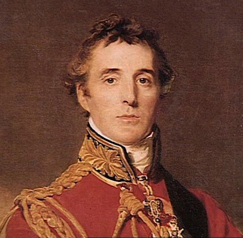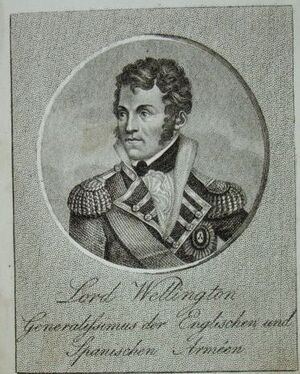Arthur Wellesley
Arthur Wellesley, better known as the Duke of Wellington, was the commander of the British army during the Napoleonic Wars. Born in Dublin, the younger son of a noble Irish family, Wellesley was apparently slow to show signs of promise, ("I don't know what I shall do with my awkward son Arthur," his mother lamented upon one occasion), but in time diligently forged himself into a professional soldier. He learned his trade while campaigning in Flanders and India.
His lordship and Jonathan Strange first became acquainted when Wellesley was fighting a successful campaign against the French in the Spanish Peninsula[29, 31]. Although at first not quick to recognize the usefulness of a magician to a military man Wellesley in time grew to value Strange very highly, candidly telling the Duke of York in 1814 "I have a great opinion of Mr. Strange's abilities"[32]. He also affectionately referred to Strange as 'Merlin'. The acquaintance of the two men was renewed when the Corsican Tyrant Buonaparte suddenly returned to power in France. Lord Wellesley at the head of an Anglo-Dutch army immediately took the field against him, and was joined in his campaign by Strange, who was of some significant help in the battles at Quatre Bras and at Waterloo[40]
Later, even after Strange had become imprisoned in the Pillar of Darkness and was to all appearances insane, his lordship did not lose faith in him. He correctly concluded that Strange's madness was a state he had deliberately courted for reasons to do with his practice of magic; he also advised sending a strong letter to the Austrians (then in control of Venice, the city where Strange resided) reminding them of the value that Great Britain placed on her magician, and suggesting they should on no account attempt to do him any harm[58].

